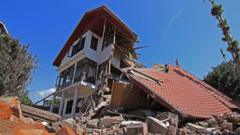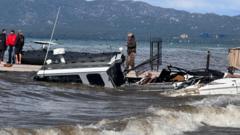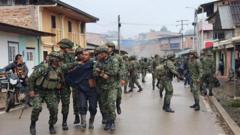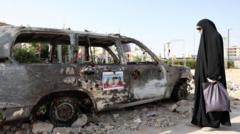The recent attack on civilians in Kashmir has led Indian authorities to detain over 1,500 individuals for questioning and demolish the homes of at least ten alleged militants. The Indian government blames Pakistan for backing these militants, but has not specified any group responsible. This violence marks the deadliest civilian attack in two decades, sparking tensions between India and Pakistan and raising questions about the potential for military responses.
India Responds with Force Following Deadly Kashmir Attack

India Responds with Force Following Deadly Kashmir Attack
In the aftermath of a tragic attack in Indian-administered Kashmir that resulted in 26 deaths, authorities are taking extensive measures against suspected militants, including demolishing properties linked to alleged perpetrators.
Authorities in Indian-administered Kashmir are intensifying their search for suspects following last week's attack that left 26 people dead. In a bid to deter future violence, security forces have demolished the homes of at least ten alleged militants linked to the tragic event, employing explosives in operations conducted since the attack near the tourist town of Pahalgam.
India claims that Pakistan supports the militants involved but has yet to identify a specific group. Islamabad has strongly denied these allegations. The incident marks the deadliest attack on civilians in the region in over two decades, reigniting long-standing tensions between the two countries that both claim the territory of Kashmir and have engaged in two wars over it.
In the wake of the attack, Indian security forces have reportedly detained more than 1,500 people for questioning, although the figures regarding additional detentions remain unclear. The demolitions of militants' homes began last Thursday and have continued through the weekend. Though officials have not publicly addressed the demolition strategy, it is known that many targeted properties belonged to families of militants or those who have relocated to Pakistan.
While leaders in Kashmir have expressed support for action against militants, they have also raised concerns about the impact of these demolitions on innocent civilians. Jammu and Kashmir Chief Minister Omar Abdullah remarked that the guilty must be punished without affecting the innocent, echoing former chief minister Mehbooba Mufti's call for caution in distinguishing between terrorists and civilians.
The violence has prompted a backlash against Kashmiris in other parts of India, with reports of attacks and threats against students from the region. The Indian police have named three suspects involved in the Pahalgam killings, with two identified as Pakistani nationals and one as a local resident. Contradictory reports suggest that a group called the Resistance Front may have initially claimed responsibility but later denied involvement, complicating the investigation.
As India grapples with the fallout of this attack, Prime Minister Narendra Modi has promised to relentlessly pursue justice for the victim's families, emphasizing that the recent violence is an attempt to undermine the restoration of normalcy in the region after years of turmoil. The situation has escalated tensions between India and Pakistan, with both sides suspending diplomatic agreements and responding with military-related measures.
The United States has expressed concern, urging both nations to work towards a diplomatic resolution, as fears continue to grow about the potential for further escalation of hostilities in a historically volatile region.





















